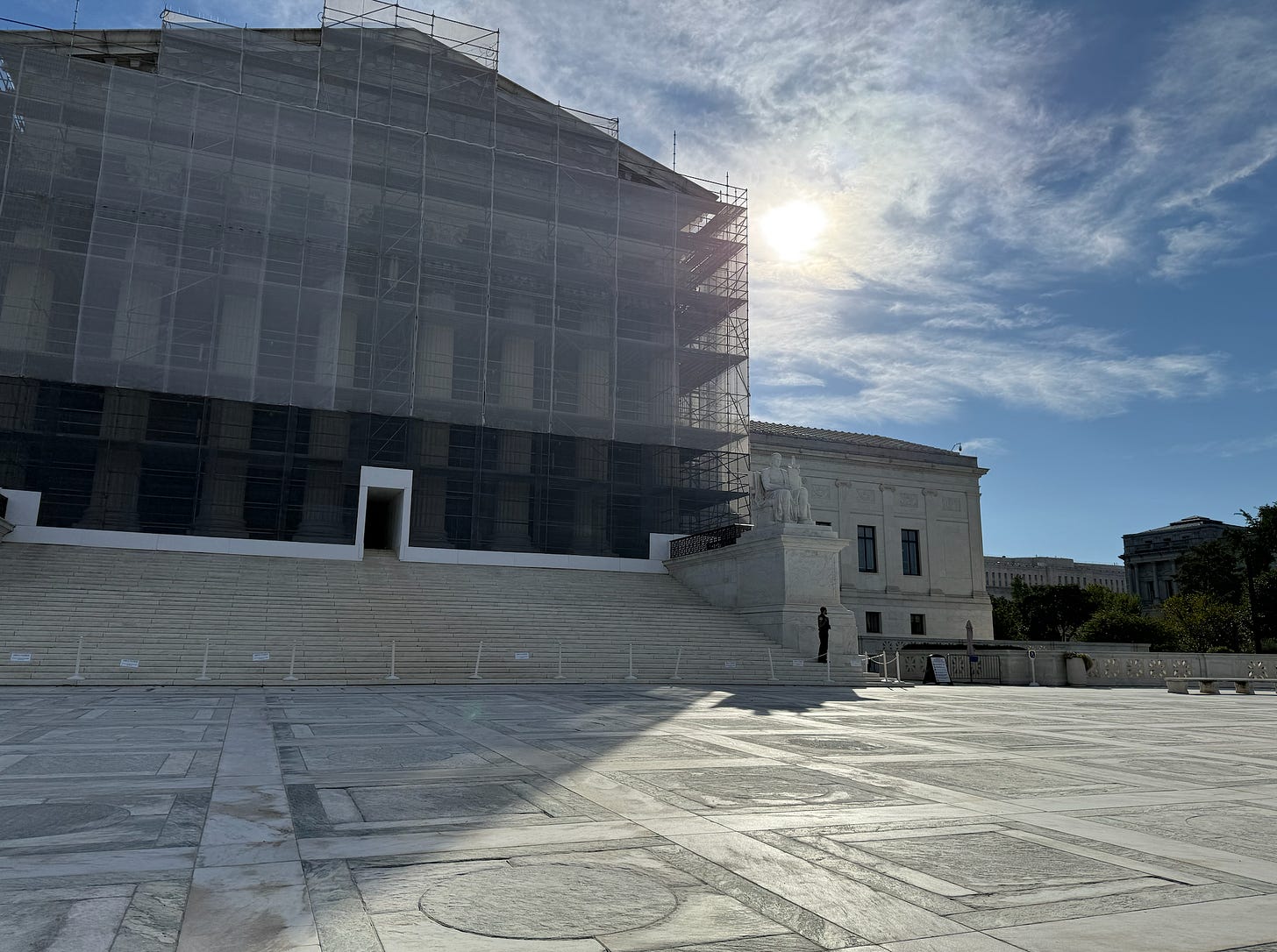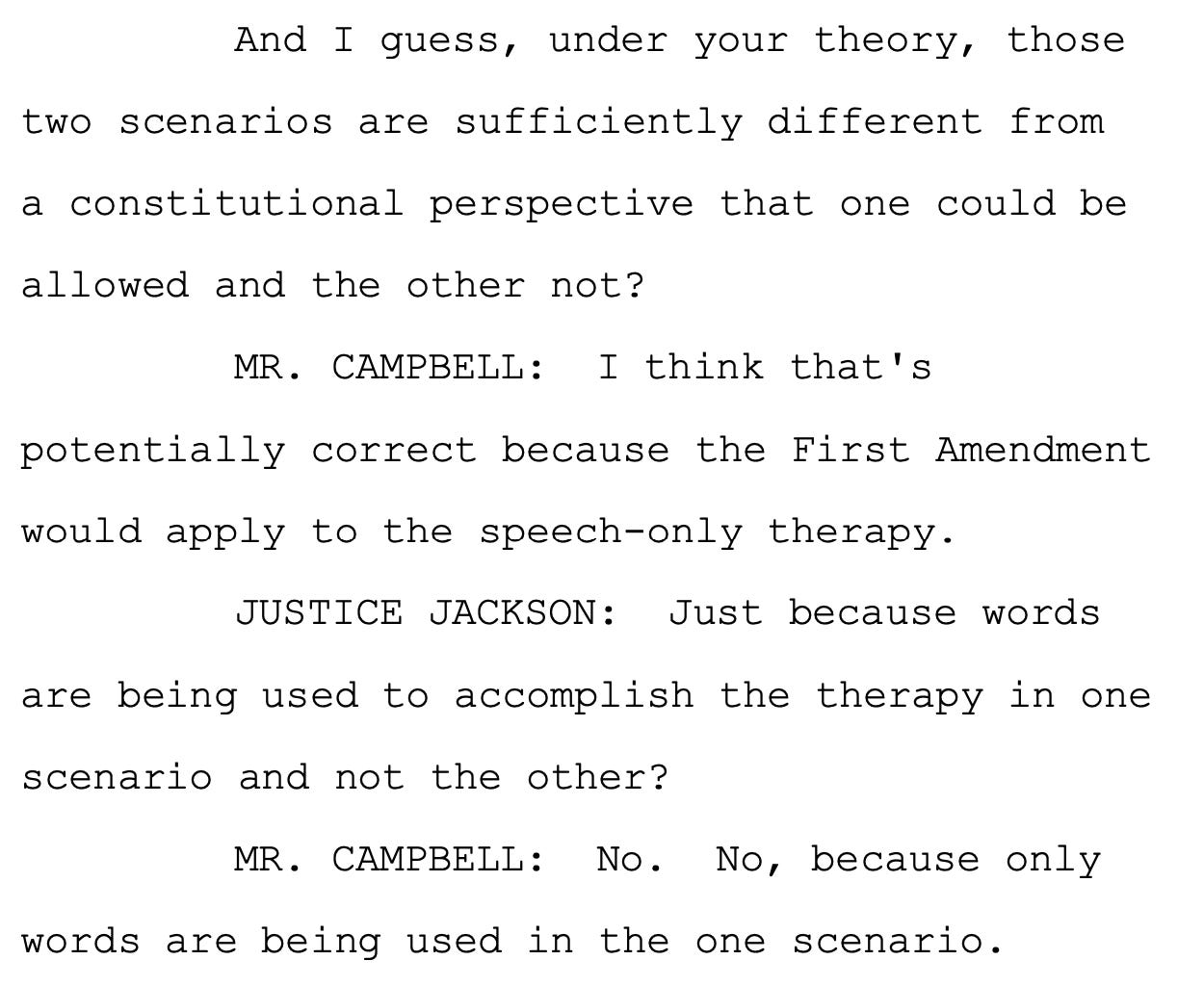Supreme Court likely to strike down Colorado's conversion therapy ban
A lesson in how defining the case often resolves the case.
The U.S. Supreme Court on Tuesday appeared likely to strike down Colorado’s ban on conversion therapy by licensed therapists practiced on minors — a ruling that could affect similar laws in nearly half the country and make life more difficult for LGBTQ children at an already perilous time.
It was a sharp lesson in how much power the court has in resolving cases through definitions — while claiming to stay out of the political and policy debates.
Just a few months ago, Chief Justice John Roberts showed in June how far that can go. When Roberts insisted that Tennessee’s ban on gender-affirming medical care for transgender minors was a law that classified based on “age” and “medical use” — not “sex” or “transgender status,” as anyone who supports or opposes that law knows it is, in fact, based on — he essentially ended the challenge to the law.
Fast-forward to Tuesday, and we were living in a very different world — “free speech land,” as Justice Elena Kagan called it at one point.
Although Colorado describes its ban on conversion therapy as “a practice or treatment performed for the purpose of changing the patient’s sexual orientation or gender identity,“ the Supreme Court was not ready to define it in a way that averts constitutional concern.
There was little “medical use” talk on Tuesday in the Chiles v. Salazar arguments. Instead, the majority appeared ready to judge this as a “pure speech” First Amendment case, as Justice Sam Alito put it.
At one point in Tuesday morning’s arguments, which moved quickly and lasted just under 90 minutes, Justice Ketanji Brown Jackson asked James Campbell, the lawyer for therapist at the center of the case, “I’m just unclear as to whether or not you’re categorizing her therapy as a medical treatment.“
A lawyer with Alliance Defending Freedom — the far-right religious legal advocacy group that has fought against LGBTQ rights across the nation — Campbell responded, “I don’t think it matters because the First Amendment depends on the difference between speech and conduct, not on the difference between treatment and non-treatment.“
Campbell’s position for Kaley Chiles is instinctively compelling, builds off the Supreme Court’s 2018 decision striking down California’s effort to require “crisis pregnancy centers” to provide certain information to people who come to the centers, and appeared to have support from a strong majority of the justices on Tuesday.
It is important, however, to see how that position ultimately is just a different version of the outcome-determinative definition of the case that was seen in United States v. Skrmetti.
Campbell’s argument, which was largely echoed by the Trump administration in arguments by Principal Deputy Solicitor General Hashim Mooppan, amounts to an argument that speech is speech, no matter where it happens and in what context it happens, and any state effort to regulate that speech is to be subjected to strict scrutiny — meaning it likely would be found unconstitutional.
It’s very easy to be won over by that, but I want to step back and show how differently such a matter can be framed.
“[T]he State does not lose its power to regulate commercial activity deemed harmful to the public whenever speech is a component of that activity.“
Where did that come from? A 1978 opinion of the Supreme Court — cited positively in the 2018 California case — involving an attorney advertising and solicitation regulation. It’s hard to imagine many professions more speech-related than lawyers and yet the court has upheld many restrictions on the members of that profession.
“Numerous examples could be cited of communications that are regulated without offending the First Amendment,” Justice Lewis Powell wrote for the 1978 court in deciding the case, referencing information about securities, corporate statements, and employers’ retaliatory threats.
Forty years later, in National Institute of Family and Life Advocates v. Becerra, however, California’s law was struck down. In that opinion, Justice Clarence Thomas’s opinion for the court pushed back at the idea that “professional speech” is less protected.
“This Court’s precedents do not recognize such a tradition for a category called ‘professional speech,’” he wrote, citing only “two circumstances” where he stated the court has given “less protection for professional speech.“ He defined them as:
some laws that require professionals to disclose factual, noncontroversial information in their “commercial speech.”
professional conduct, even though that conduct incidentally involves speech.
On Tuesday, that “incidental“ aspect of the NIFLA discussion was central to the court’s arguments — coming up more than a dozen times. Campbell and Mooppan’s argument was that talk therapy doesn’t “incidentally” involve speech — it is speech.
“[I]f the treatment consists only of speech, then it doesn’t trigger the speech-incidental-to-conduct doctrine. And, here, we’re just in First Amendment land, where there is full, robust protection,” Campbell told Jackson.
Teasing that out, Jackson asked Campbell about the treatment by “two licensed professionals“ of a person who said, “I’d like to live consistently with my biological sex.” One of those medical professionals treats the person with medication and the other medical professional treats the person with talk therapy. The following exchange then followed, beginning with Jackson’s question:
Depending on how the decision in Chiles v. Salazar is written, the application of Thomas’s “incidental” language in NIFLA in this way could make regulations of any profession in which speech is not just “incidental” to the profession subject to robust First Amendment protection — and presumptively unconstitutional.
Toward the end of the arguments, Kagan mused to Colorado Solicitor General Shannon Stevenson that “if the doctor said you can lower your cholesterol by going out and eating dessert every meal, we would think that was not a good thing for a doctor to say.“
But, she said, “I have this feeling that that’s a different kind of case,“ skeptically asking Stevenson:
[A]re you saying that there’s no distinction between what we’re dealing with here and the range of things that a doctor can tell you in her office about what kind of care is appropriate for any particular condition?
Stevenson stood firm:
[C]ounseling is an evidence-based practice that Petitioner trained for thousands of hours to be qualified to do. And her advice and counseling therapies through her words can be extremely harmful. And so there is no difference between that and the medical context.”
But, the majority of the court appeared to believe there is.
Ultimately, only Jackson appeared to be strongly challenging Chiles and DOJ’s arguments against Colorado’s law.
Although Justice Sonia Sotomayor initially pressed Campbell on questions suggesting Chiles might lack standing or, as Mooppan noted, that could be seen more as a mootness argument — questions about whether Colorado’s law covers the therapy Chiles is seeking to offer — that “late-breaking” argument did not have traction.
“[I]t’s just a little puzzling to me that she would stand in a different position than a medical professional who has exactly the same goals, exactly the same interests, and would just be prescribing medication for that rather than her talking with the client,“ Jackson said to an unsympathetic bench.
And yet, according to the Trump administration’s argument, Chiles is not only in a “different position.” Mooppan referred to Colorado’s law as a “sweeping categorical prior restraint” — a heavily unfavored speech restriction. The claim — not made by Campbell — was later picked up by Justice Neil Gorsuch in a question to Mooppan and Thomas in a question to Stevenson.
Stevenson did, however, “push back on the notion that this is a prior restraint on speech,“ noting that there is no enforcement of the law without a complaint, which could than lead to a hearing with the possibility of judicial review. “So it’s like many other statutes in that way. It simply calls out a specific practice that violates the standard of care.“
In that 1978 case over lawyer solicitation restrictions, there is an echo.
“Appellant’s argument misconceives the nature of the State’s interest. The Rules prohibiting solicitation are prophylactic measures whose objective is the prevention of harm before it occurs,” Powell wrote. “In such a situation, which is inherently conducive to overreaching and other forms of misconduct, the State has a strong interest in adopting and enforcing rules of conduct designed to protect the public from harmful solicitation by lawyers whom it has licensed.”
Or, as Stevenson said on Tuesday, in response to a question from Kagan about why Colorado’s decision shouldn’t be seen as impermissible viewpoint discrimination, “[T]hat’s why medical treatment has to be treated differently, because any time you exclude one harmful practice, you are by definition saying these things are allowed because they are not harmful and these things are excluded because they are harmful.“
But, because of how the issues in the cases are being defined, state legislatures can regulate attorney advertising and solicitation and the provision of gender-affirming medical care for trans minors but not “crisis pregnancy center” notices — and, it appears likely, not conversion therapy.





I’m still parsing out the implications for medical insurance if “talk therapy isn’t medical care,” the future of evidence-based arguments in future court cases, etc.
IANAL, but isn't practicing conversion therapy akin to practicing medicine without a license? This isn't true therapy; it's quackery and it's coercive and isn't successful. "Conversion therapy" represents a fraud. Fraudulent speech is not protected under the First Amendment.
Lord help me, I loathe these people.